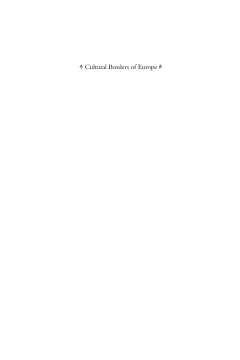
BOOK
Cultural Borders of Europe
Mats Andrén | Thomas Lindkvist | Ingmar Söhrman | Katharina Vajta
(2017)
Additional Information
Book Details
Abstract
The cultural borders of Europe are today more visible than ever, and with them comes a sense of uncertainty with respect to liberal democratic traditions: whether treated as abstractions or concrete realities, cultural divisions challenge concepts of legitimacy and political representation as well as the legal bases for citizenship. Thus, an understanding of such borders and their consequences is of utmost importance for promoting the evolution of democracy. Cultural Borders of Europe provides a wide-ranging exploration of these lines of demarcation in a variety of regions and historical eras, providing essential insights into the state of European intercultural relations today.
Thomas Lindkvist was Professor of Medieval History at the University of Gothenburg 1999-2016. His latest publication is Trade and Civilization. Economic Networks and Cultural Ties, from Prehistory to the Early Modern Era, coedited with Kristian Kristiansen and Janken Myrdal (Cambridge University Press, 2018).
Mats Andrén is Professor of the History of Ideas at the University of Gothenburg, where he also previously served as director of the Centre for European Research. His most recent book is Nuclear Waste Management and Legitimacy: Nihilism and Responsibility (Routledge, 2012).
“[Published] in the outstanding Berghahn Books 'Making Sense of History' series, [this] seminal work of scholarship throughout, Cultural Borders of Europe is an especially and unreservedly recommended addition to both community and academic library Contemporary International Studies collections.” • Midwest Book Review
“This very rich anthology, with contributions from many strands of the humanities and social sciences, should enrich the field of border(ing) studies that is now in high demand.” • Thomas Lundén, Södertörn University
Katharina Vajta is senior lecturer in French at the Department of Languages and Literatures at the University of Gothenburg, where she also is Head of Department.
Ingmar Söhrman was Professor of Romance languages at the University of Gothenburg. Among his publications is Diachronic and Typical Perspectives on Verbs (John Benjamins, 2013), coedited with Folke Josephson.
Table of Contents
| Section Title | Page | Action | Price |
|---|---|---|---|
| Half-Title | i | ||
| Cultural Borders of Europe | iii | ||
| Contents | v | ||
| List of Figures and Tables | vii | ||
| Introduction | 1 | ||
| Part I. The Challenges of Religious Borders | 19 | ||
| Chapter 1. Territorial and Religious Identifications in Europe | 21 | ||
| Chapter 2. Europe with or without Muslims | 40 | ||
| Chapter 3. Ilm al-Hududiyya | 54 | ||
| Part II. Linguistic Borders in Practice | 69 | ||
| Chapter 4. When the Intercultural Goes National | 71 | ||
| Chapter 5. The Pluricentric Borders of Bavaria | 85 | ||
| Chapter 6. The Influence of Imagined Linguistic Performances | 100 | ||
| Part III. Mental Spaces and Barriers | 115 | ||
| Chapter 7. Mental Barriers Replacing Nation-State Borders | 117 | ||
| Chapter 8. Crossing Borders and Redefining Oneself | 128 | ||
| Chapter 9. Evolving Symbolic Divides in Basque Language Promotion Logos | 143 | ||
| Part IV. Scholars Making Borders | 157 | ||
| Chapter 10. The Controversial Concept of European Identity | 159 | ||
| Chapter 11. The EU as a ‘Large Space’? | 170 | ||
| Chapter 12. How Prehistory Becomes Crucial for Border Making | 184 | ||
| Conclusion | 196 | ||
| Index | 201 |
